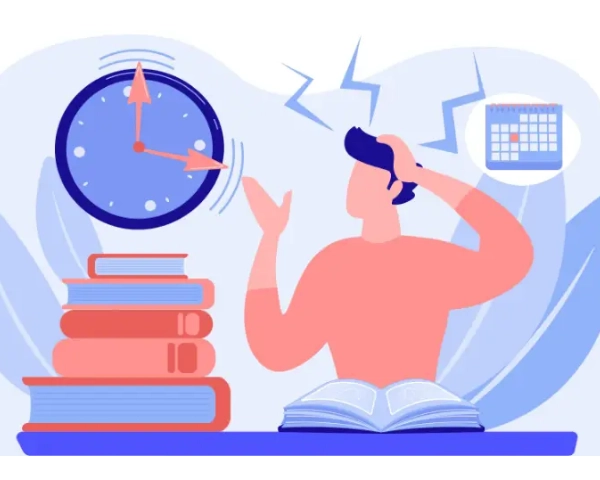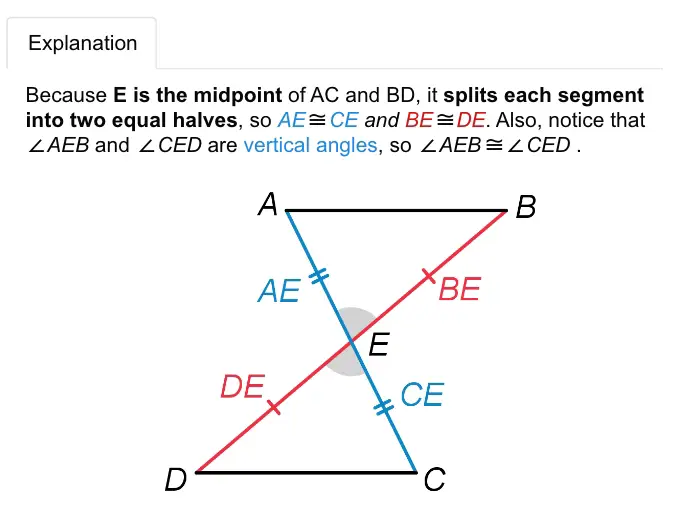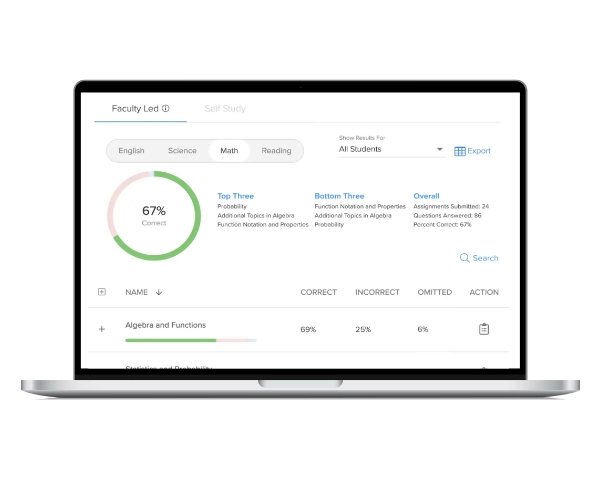The concept of “equity” in education continues to be a hot-button topic across the United States. Educators understand the importance of the idea and know that striving for equity in everything from standardized testing to exam prep is an ongoing and evolving process.
We sat down with three former and current educators who work with college admissions prep materials to talk about equitable learning opportunities, especially as they pertain to SAT® and ACT® prep.
Meet Our Educators
- Stephanie Barron: Stephanie is a former teacher with over 10 years of experience at the secondary level. She left the classroom in 2023 but continues to work in the industry by connecting educators to UWorld’s test prep materials. Stephanie chose to continue her career at UWorld because it allows her to continue advocating for educators and students.
- Andrew Ellington: Andrew is a private tutor with over 12 years of experience and a specialization in SAT and ACT exam preparation. Andrew loves his role as a senior product specialist at UWorld because it allows him to actively educate students and help them meet their college admissions goals.
- Laura Maddaford: Laura left the classroom in 2023 after teaching high school and dual credit courses for over a decade. She currently works as an implementation specialist at UWorld and plans on teaching adjunct courses in the future. She is passionate about advocating for students and teachers, especially when it comes to creating equitable opportunities in the classroom.
Q: Is High School Standardized Testing Equitable?
Andrew:
By saying “standardized,” we've already indicated the implicit inequity of the exam. Anything that provides a standard bar for people to clear has got to be placed somewhere in the middle of a demographic or else it's not a bar that would be meaningful to clear. But because we have such high achievers on a wide spectrum, there's always going to be groups that are set really below the bar. If we're making things reasonably challenging for students from better social backgrounds who have more access to resources, then those same things are going to be much harder for students with lesser access to resources.

Stephanie:
In general, standardized testing isn’t equitable at all. I taught at a high school with a student population that was half low-income and half upper-class, and the disparities that these kids came to school with were pretty obvious. The lack of academic resources at most schools is just problematic, but if you're born into a family where you have parents who can read to you, or if they speak English, that makes a difference. The test is especially inequitable for our English Language Learners (ELLs) and our Special Ed students.
What Causes Testing Inequity Among Students?
Andrew:
Most people recognize that poverty is not simply an issue of the lack of financial resources. It is also about a lack of temporal resources because being poor takes up more time. If you are poor, everything you do is with less access and convenience. You have more things throughout your day that you need to do yourself … more things that you need to focus on in terms of survivability.
Many students have to work after school or have to go home and take care of their younger siblings. There’s a difference in how many resources people have in terms of having access to good internet, good technology, and good books. Libraries have various programs, but participating in those also involves questions like: Do you have a way to get to the library after school? Can you go to the library instead of going to work, or go to the library instead of watching your baby sister? There's always something coming up.
If you're trying to get ready for an exam or just trying to do well academically, you've got to have time to rest and to think and to build ideas. That’s in addition to the many hours of homework schools are giving out to high schoolers.
Laura:
We have low-income schools, schools with poor Wi-Fi, and schools where the standards of reading are different because they're trying to catch students up. This might be because of their immigration status or many other plausible reasons. So, the idea that we can have one standardized test for schools with different funding available is kind of perplexing.
It’s an interesting thought that we can believe it is an equitable test. We have no standardization in school funding across the nation. Higher-income bases often have students with more involved parents, which tends to create more support at home. This, of course, typically results in higher scores and kids who are more engaged.
On the other hand, low-income schools don't have the same kind of access. There are Title 1 low-income schools, and then there are low-income schools that should be Title 1 but don’t qualify for some reason or another. They don't receive Title 1 funding. These schools are underfunded, and a lot of teachers don't want to teach at them because you have to get very creative with your resources. You also tend to teach students who are facing a lot of outside problems that higher-income student populations don’t have to face. That makes it very difficult to create an equitable standard for students to have.
Do Tutorial Programs Provide Equitable Learning Opportunities To Succeed on the SAT and ACT?
Andrew:
Even if every student had the time for it, tutoring is an unregulated industry. If we think there's a wild disparity regarding how qualified certain teachers are within the public school system, consider that literally any person can say they are a private tutor. They're happy to take your money, and they may or may not have any experience as an SAT or ACT tutor.
Or maybe you can only afford to send your child to a group tutoring session because those tend to be more affordable. But the whole point of tutoring is to give students individualized attention. If a student has to share that attention with a group of students at a tutoring facility, they are not getting much more attention than they would get during their regular class. The 1-to-30 ratio that we have in so many classrooms isn't working for students, either, so why would it work better for them when it's maybe a 1-to-20 ratio at a tutoring center?

Laura:
Tutorial sessions could possibly help. However, we have to ask: How are kids getting to school for these tutoring sessions, and what else from their schedule is being cut out? A lot of my students from low-income schools have to prepare their brothers and sisters for school before dropping them off. They often get to school late or right on time. They work jobs.
If it's a tutorial program within the regular school day, are they losing out on an elective or being asked to give up a sport? It's always a give and take. Unfortunately, adding more school might not be the right answer. It might just need to be a different type of approach altogether.
Do Free Resources Provide an Equitable Opportunity To Succeed on the SAT and ACT?
Stephanie:
No. Again, you're going back to the accessibility of the resources. Do the kids have a working computer at home? Do they have internet? Do they have electricity? Do they have access to SAT prep resources on a computer? I also think if you don't have somebody at home who speaks English and you already come to school with a language barrier, or if you come from a lower income background, you won't know how to approach the free study materials without somebody to help you learn how to use them effectively.
Laura:
If you use the free test prep resources, the answers to the questions are out there on the internet already. There's no need to think if someone’s already done the thinking for you. Or, the questions often start too high, and a lot of them don't scaffold for students at all. So, if we have lower-income kids who need to begin their test prep at that lower foundational skill level, there's no built-in scaffolding. The free resources either start too high or aren’t rigorous enough, and they don’t build the students’ knowledge base.

What Kind of Test Prep Materials Do Students Need To Have a Better Chance on the SAT and ACT?
Stephanie:
It’s about quality materials and providing students with the proper instruction to help bridge their learning gaps. We know that scaffolding is vitally important for students, but this is especially the case for lower-income and ESL kids. So, if there’s a resource that can scaffold them appropriately and give them the background knowledge to understand what the question is asking, then great.
To be truly equitable, standardized test prep needs to be a part of each student’s course load without taking away their electives. The resource needs to be something that can be built into time during school, with educators and students working side-by-side.

Laura:
A good guided practice is one that can be facilitated by some sort of educator with immediate feedback and in-depth explanations that can identify student weaknesses. Students can then do a secondary practice that will actually help them reinforce and grow the skills necessary to give them a shot at getting the scores they want. A lot of students don't even understand the importance of this. A resource like this should be paired with someone who can explain why it's important and what it can do for their students. That is a game changer for a lot of our kids.
What Is the Best Solution for Creating Equitable Access to Quality SAT and ACT Test Prep Materials?
Stephanie:
School districts always talk about being in the business of kids, so if possible, they should provide a resource that is valuable and can be utilized in some capacity. For example, you can use it in your English classes to scaffold skills that the students need to be successful on the exam. That's the actual business of kids.
Then we have to figure out how to build these resources into our classes … and make that a #1 priority. You have to convince your teachers of the importance of doing this, too, because teachers are already overwhelmed. So changes like this are a really hard sell nowadays. You have to have some kind of built-in tutoring time or you have to start organically building it into your classrooms.
Andrew:
Admin can find a way to provide the time, space, and test prep resources … and make these resources available saying, “Hey, here’s one thing that we know really works, and here's a place in the school where you can use it, and here's another place where you can potentially use it after school.”
Laura:
Districts, as a whole, need to buy programs and then implement them across the district, evenly, with qualified teachers who have been trained to use those materials. It would be even better if a bigger financial source, like state funding, would actually buy and distribute resources throughout their schools.
We're going to have to start seeing low-income schools start to invest in programs that will help their kids bridge those gaps instead of trusting that all of the necessary foundational knowledge and test-taking skills will be learned in class because testing skills are totally different than every other skill.
You have to be able to reason out question stems and eliminate wrong answers. Districts are going to have to invest in these resources. And it's not teaching to the test in the way of having students memorize everything because you can't do that for the SAT or ACT. They really are skills-based tests. With the right resources, students can have not just the necessary foundational knowledge but also the necessary testing skills.
Continuing the Test Equity Discussion
“I really hope that we can have quality conversations between educational decision-makers and teachers about this topic,” said Stephanie. “All of us have teachers in our lives. There's not a single person that hasn’t had a teacher in their life. Let's make educated decisions based on discussions. I think if we could have open, positive conversations, there could be a lot of positive change.”





